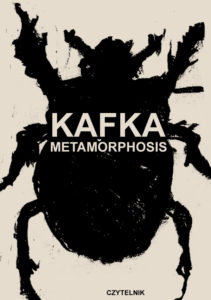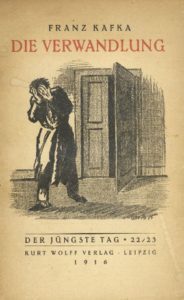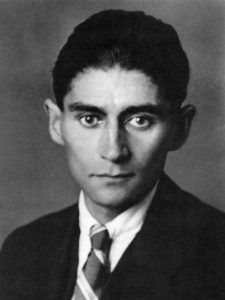Good morning, class.
 I’ve made it clear that my favorite eras of literature are modernism and postmodernism, mostly because they break the rules. I’m not a natural rule breaker in real life, but I love rule-breaking when it comes to literature—I want my novels weird, thought-provoking, discomforting, and rebellious. That’s why my favorite novels from the list include Ulysses and The Great Gatsby, and that’s why I think novels like To the Lighthouse, As I Lay Dying, and All the King’s Men should be included on the list of books everyone should read before they die. The same goes for the German novel The Metamorphosis by Franz Kafka, one of the weirdest and most challenging novels I’ve ever read.
I’ve made it clear that my favorite eras of literature are modernism and postmodernism, mostly because they break the rules. I’m not a natural rule breaker in real life, but I love rule-breaking when it comes to literature—I want my novels weird, thought-provoking, discomforting, and rebellious. That’s why my favorite novels from the list include Ulysses and The Great Gatsby, and that’s why I think novels like To the Lighthouse, As I Lay Dying, and All the King’s Men should be included on the list of books everyone should read before they die. The same goes for the German novel The Metamorphosis by Franz Kafka, one of the weirdest and most challenging novels I’ve ever read.
The plot is half of what makes The Metamorphosis good—Gregor Samsa, an average man trying to support his parents and younger sister, wakes up one morning to discover he has transformed into a giant bug. There’s no explanation, no meaning (no rules) . . . just the terrible event itself is enough to propel the story forward. Gregor’s first impulses are to think about his job and how he will continue to support his family, and how to adjust to this sudden ailment. He doesn’t give himself time to think about much else—he doesn’t have time to waste.
Gregor can’t communicate with his family (or his employer), and the members of the Samsa family are all forced to adjust to Gregor’s metamorphosis, too. This includes feeding Gregor, who now only likes rotten things like spoiled meat or old fruit. Cleaning becomes quite an issue, because Gregor can no longer clean his room in his current state; Gregor’s sister Grete becomes accustomed to cleaning while he hides under the bed, worried about scaring her by showing himself. Of course, the hardest adjustments involve the family getting by without Gregor working. Mr. Samsa’s old age and Mrs. Samsa’s asthma are obstacles to overcome in order to get jobs, while Grete at 17 years old can only do so much.
 The story doesn’t waver from this approach. The Metamorphosis is the most absurd family drama ever written, about how a family deals with the weight of their dutiful Gregor’s untimely transformation. Any truly fantasy narrative would capitalize on the strangeness of the fantasy, but instead, Kafka makes his story about the regular struggles of everyday life—just with an added wrinkle. Few novels can pull this off well, so for that alone, The Metamorphosis deserves to be on the list.
The story doesn’t waver from this approach. The Metamorphosis is the most absurd family drama ever written, about how a family deals with the weight of their dutiful Gregor’s untimely transformation. Any truly fantasy narrative would capitalize on the strangeness of the fantasy, but instead, Kafka makes his story about the regular struggles of everyday life—just with an added wrinkle. Few novels can pull this off well, so for that alone, The Metamorphosis deserves to be on the list.
(Side note: the use of fantasy elements combined with the mundane realities of life is a literary technique called magical realism. Most fantasy stories are about escape—fantasy as a way to abandon the struggles of everyday life—and magical realism is the exact opposite. Magical realism happens when you are magically transformed into a bug and still have to pay your bills, for instance. It’s an amazing storytelling sub-genre and is one of the hallmarks of modern and postmodern literature.)

Author Franz Kafka
The other half of what makes The Metamorphosis so good is how Kafka manages to take an absurdly mundane plot to show intimate and vulnerable truths about humanity and loneliness. Gregor’s transformation and the events that follow are sometimes funny and sometimes horrifying; Kafka toes the line between those extremes in order to convince us how sad Gregor’s story is. His transformation may or may not have stripped him of his humanity, as he simultaneously thinks with the instincts of a bug and with the care and concern of a brother and son. Without the ability to communicate, he suffers alone and watches his family suffer, too. It’s not much of a spoiler to see that The Metamorphosis has barely a shred of a happy ending.
So, The Metamorphosis becomes this concoction of strange and boring, with a dash of depressing. No, it’s not a delightful story, but it never set out to be and never needs to be. Instead, The Metamorphosis is a story born out of a very human place about a seemingly inhuman creature, and it’s absolutely worth reading by everyone.
Next time, we’ll jump into my experience of reading Ernest Hemingway’s short story collection, Men Without Women. I’ll discuss my complicated experiences with Hemingway, as well as what I liked and didn’t like about his short stories—I can only promise you that I’m biased, and that my next lecture won’t be so typical.
Until then,
Prof. Jeffrey
Recent Comments